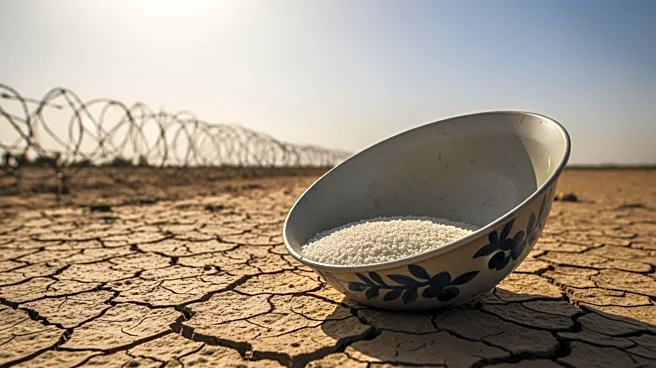What's Happening?
The Integrated Food Security Phase Classification (IPC) has confirmed the presence of famine in two regions of Sudan, specifically in el-Fasher in Darfur and Kadugli in South Kordofan province. This declaration
comes amidst a severe humanitarian crisis exacerbated by ongoing conflict since April 2023. The IPC's criteria for famine include extreme food shortages, high levels of acute malnutrition among children under five, and significant mortality rates due to malnutrition and disease. The conflict has displaced millions and created dire conditions, with paramilitary forces, particularly the Rapid Support Forces (RSF), intensifying their control over these regions. The IPC report highlights that 375,000 people are currently experiencing famine conditions, with an additional 6.3 million facing extreme hunger across Sudan.
Why It's Important?
The confirmation of famine in Sudan underscores a critical humanitarian emergency with far-reaching implications. The ongoing conflict has not only led to a massive displacement of people but also severely disrupted food supplies, leading to widespread malnutrition and starvation. This situation poses a significant challenge for international aid organizations and governments attempting to provide relief and support. The humanitarian crisis in Sudan could potentially destabilize the region further, affecting neighboring countries and international relations. The IPC's call for a ceasefire highlights the urgent need for political solutions to prevent further loss of life and mitigate the extreme levels of food insecurity.
What's Next?
The IPC has called for an immediate ceasefire as a necessary step to prevent further deterioration of the humanitarian situation in Sudan. This call to action may prompt international diplomatic efforts to broker peace and facilitate humanitarian access. Aid organizations are likely to increase their efforts to deliver food and medical supplies to the affected regions, although access remains a significant challenge due to ongoing hostilities. The international community may also face pressure to impose sanctions or take other measures against those perpetuating the conflict. Monitoring the situation closely will be crucial to assess the effectiveness of any interventions and to adapt strategies as needed.
Beyond the Headlines
The famine in Sudan highlights deeper issues related to governance, resource allocation, and international response to humanitarian crises. The conflict has exposed vulnerabilities in Sudan's political and economic systems, which have been exacerbated by external factors such as climate change and global economic pressures. The situation raises ethical questions about the responsibility of the international community to intervene in sovereign nations facing internal strife. Long-term solutions will require addressing the root causes of conflict, including political power struggles and economic disparities, to prevent future humanitarian disasters.









